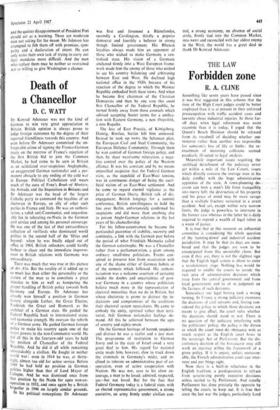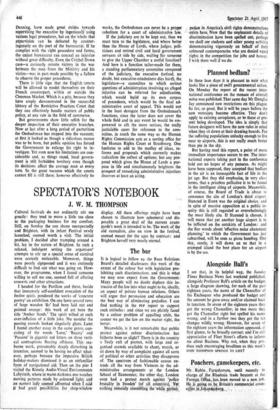Forbidden zone
THE LAW R. A. CLINE
Something like seven years have passed since it: was first suggested in this •column that the time of the High Court judges could be better employed than it is at present in their enforced preoccupation with traffic accident cases and lawsuits about industrial injuries. In those far- off days when legal reformism was more eccentric than it is today, I urged that the Queen's Bench Division should be released from its treadmill of deciding whether one motorist rather than another was responsible for someone's loss of life or limbs: the re- enactment of motoring collisions 'seemed peculiarly ill-suited to legal analysis.
Meanwhile important issues requiring the apolitical detachment of the judiciary never get within a mile of the Law Courts, issues which directly concern the average man in his daily conflict with the huge administrative apparatus of the state. A town-planning• cision can turn a man's life from tranquillity _ into merry hell; the destruction of his property and his peace of mind may be more savage than a multiple fracture sustained in a street accident. And yet, except within very narrow limits, the judge is powerless to intervene in the former case whereas in the latter he is daily required to expend a wealth of legal talent in a waste of justice.
It is true that at this moment an influential committee is considering the whole question. of the 'running-down' and industrial accident jurisdiction. It may be that its days are num- bered and that the judges are soon to be emancipated from this unsuitable chore. But even if they are, there is not the slightest sign that the English legal system is about to enter a revolutionary stage. Nothing less would be required to enable the courts to invade the vast area of administrative decisions which issue from the central government and from local government and to sit in judgment on the fairness of such decisions.
Somewhere our legal history took a wrong turning. In France a strong judiciary examines the decisions of civil servants and, having con- sidered the policy to which those decisions are meant to give effect, the court rules whether the decisions should stand or not. There is no question of the judiciary interfering with the politicians' policy; the policy is the datum to which the court must do obeisance with as much respect as the English court bows to the sovereign Act of Parliament. But the dis- cretionary decision of the bureaucrat may still work an injustice within the framework of a given policy. If it is unjust, unfair, unreason- able, the French administrative court can inter- vene and put things right.
Now there is a built-in reluctance in the English tradition, a predispOsition to refrain from' scrutinising purely executive decisions unless invited to by Parliament. And usually Parliament has done precisely the opposite by telling the courts to keep out. It is true that since the last war the judges, particularly. Lord Denning, have made great strides towards supervising the executive by ingeniously using various legal procedures, but on the whole that supervision can be defeated by counter- ingenuity on the part of the bureaucrat. If he complies with the right procedure and forms, the unjust bureaucrat can conceal an injustice without great difficulty. Even the Crichel Down case—a curiously remote victory in the war between the man from the Ministry and his victim—was in part made possible by a failure to observe the proper procedures.
There is little sign that the English courts will be allowed to model themselves on their French counterpart, within or outside the Common Market. Which is a pity, because they have amply demonstrated in the successful history of the Restrictive Practices Court that they can effectively handle matters of public policy, at any rate in the field of commerce.
But governments show little relish for the deeper inspection of their executive branches. Now at last after a long period of parturition the Ombudsman has stepped into the vacuum; at first it looked as though a ridiculous mouse was to be born, but public opinion has forced the Government to enlarge his right to in- vestigate. Yet even now his limitations are con- siderable and, as things stand, local govern- ment is still forbidden territory even though its decisions affect the average man at every turn. So the great vacuum which the courts cannot fill is still there; however effectively he works, the Ombudsman can never be a proper substitute for a court of administrative law.
If the judiciary are to be kept out, then we must turn to the legislature, and where better than the House of Lords, where judges, poli- ticians and retired civil and local government servants sit side by side, waiting for someone to give the Upper Chamber a useful function? And here is a function tailor-made for them, a standing parliamentary committee composed of the judiciary, the executive (retired, no doubt, but executive-mindedness dies hard), the legislature—a committee to which serious questions of administration involving an alleged injustice can be referred for adjudication, which would build up its own corpus of precedents, which would be the final ad- ministrative court of appeal. This would not in the least derogate from the Ombudsman's functions, since the latter does not cover the whole field and in any event he would be em- powered to sift the more serious, the really justiciable cases for reference to the com- mittee, in much the same way as the Human Rights Commission acts as a sorting office for the Human Rights Court at Strasbourg. One hesitates to add to the medley of ideas, re- forms and proposals which currently makes radicalism the softest of options; but any pro- posal which gives the House of Lords a pur- pose in life and simultaneously brightens the prospect of remedying administrative injustices deserves at least an airing.







































 Previous page
Previous page